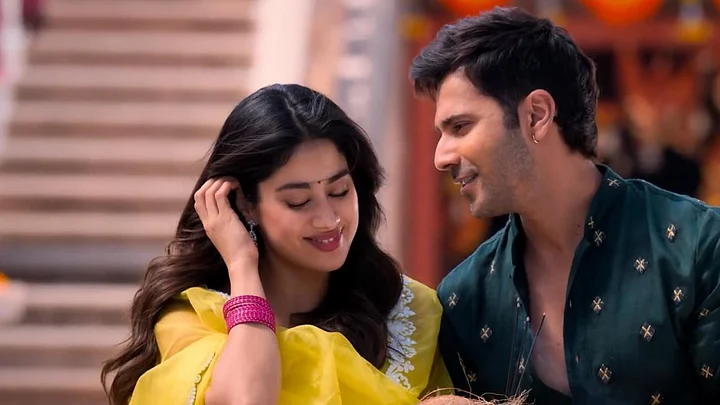When the trailer of Sunny Sanskari Ki Tulsi Kumari was released, a friend commented that writer-director Shashank Khaitan seems to live entirely in his own world. Nobody in this film has anything remotely approaching a nuanced personality, and no conflict or resolution springs from anywhere but Khaitan’s own colourful imagination.
And you know what? I’m here for it. If Khaitan keeps churning out low-maintenance, high-gloss rom-coms every few years, I’ll be lining up to buy tickets to his world of bumbling men, beautiful women, glittering clothes and happy endings. (He ventured into the real world with Dhadak, failed signally and wisely burrowed back into his cute warren.)
He doesn’t display a wide range in his storytelling, but he knows how to give us a pretty good time.
Well-Matched Leads
In this, Khaitan has found an apposite collaborator in leading man Varun Dhawan—this is their third film together—who plays Sunny Sanskari. It’s true, as theatregoers in my hall bemoaned, that Dhawan has been doing the same thing in his films for a decade—but see how he can still sell the silliest of jokes (watch him tell his lady love that she’s healthy for the heart like desi ghee), shed tears on cue, and dance like his limbs are detaching from his body. It isn’t great acting; it’s sheer screen presence—and again and again, it works.
It’s a pity Khaitan has not cast Alia Bhatt this time, because it was Bhatt’s sparkling chemistry with Dhawan that kept both of Khaitan’s first two films thrumming with energy—particularly Humpty Sharma Ki Dulhania.
Instead, the leading lady, Tulsi Kumari, is played by Janhvi Kapoor—in her second film opposite Dhawan after the ambitious but fatally flawed Bawaal—and she can actually do over-the-top comedy! Forgive the tone of surprise, but if you saw Kapoor desperately trying to be funny in Param Sundari earlier this year, you would be surprised too. Here, she strikes the right balance between earnest and flippant, and proves a good match (if not Bhatt-level great) for Dhawan’s antics.
It’s a good year to be a Janhvi Kapoor admirer, too—just last week, she turned in a suitably muted supporting performance in Homebound, and now she’s the glamorous heroine.
A Lovelorn Foursome
Sunny and Tulsi come together when their respective exes, Ananya (Sanya Malhotra) and Vikram (Rohit Saraf), dump them to marry each other. Determined to break up the marriage and win back their loves, Sunny and Tulsi show up at the wedding in Rajasthan, posing as a couple with serious let’s-make-them-jealous plans.
The ending is foregone, of course—there’s nothing quite like a film’s title being its own biggest spoiler—but to Khaitan’s credit, the intermingling of the four central figures becomes pleasurably muddled, especially in the most enjoyable song on the soundtrack, ‘Panwadi’ (composed by APS with lyrics by Jairaj).
Vikram and Ananya quickly begin to feel weird around Tulsi and Sunny, especially since they turn up practically in each other’s arms. But Sunny also begins to develop feelings for Tulsi—illustrated by the interval point, which is a good example of Khaitan’s ability to undercut a potentially serious moment with a dumb gag.
A night of drunken bonding ends with Sunny and Tulsi spooning, a visual that makes its point clearly. But then, Sunny has a ridiculous dream featuring Tulsi and it’s this dream—not the physical intimacy—that makes him re-evaluate his feelings for both her and Ananya.
Tulsi isn’t so easily waylaid by Sunny, though. She keeps her eyes on the prize (Vikram) for much longer. This makes sense, considering that she and Vikram were committedly together for twelve years, while Sunny and Ananya had only two—two years that Ananya dismisses as a situationship.
By resisting making the love story lazily symmetrical—having Sunny and Tulsi fall for each other at the same time, and Ananya and Vikram move on—the film continued to keep my interest.
For a moment, I even wondered if Khaitan would take the Shakun Batra route—cast rom-com leads (Kareena Kapoor and Imran Khan) in a film with a lovey-dovey title (Ek Main Aur Ekk Tu) and then pull the rug out from under our feet with a surprise ending.
A Traditionalist at Heart
But Khaitan is a traditionalist at heart: that’s why his films have Bollywood staples in the form of comedy tracks (Maniesh Paul and Abhinav Sharma thirsting after the same willowy woman), party songs, family drama, smiling-through-tears moments, and happy endings.
Plus, this is a Dharma film, and like any self-respecting Karan Johar production, it is filled with references to Kuch Kuch Hota Hai and Kabhi Khushi Kabhie Gham (the funniest is ‘Parvati bani Poo’); indeed, we actually get Johar himself, in a dippy little cameo. Talk about self-referencing!
Dhawan and Kapoor are given able support by Malhotra and Saraf, both of whom land jokes and handle Ishita Moitra’s dialogue skilfully. They even get slow-mo entry shots, which are denied to Dhawan and Kapoor. Indeed, the fact that the harebrained climax works as well as it does is due more to Malhotra and Saraf’s efforts than the lead pair’s.
And thankfully, Khaitan and Moitra keep the final Sunny-Tulsi union short and devoid of tiresome speeches. It’s just what I wanted from Sunny Sanskari Ki Tulsi Kumari: shimmering, funny, silly bang for my multiplex buck.
(Sahir Avik D'souza is a writer based in Mumbai. His work has been published by Film Companion, TimeOut, The Indian Express and EPW. He is an editorial assistant at Marg magazine.)
